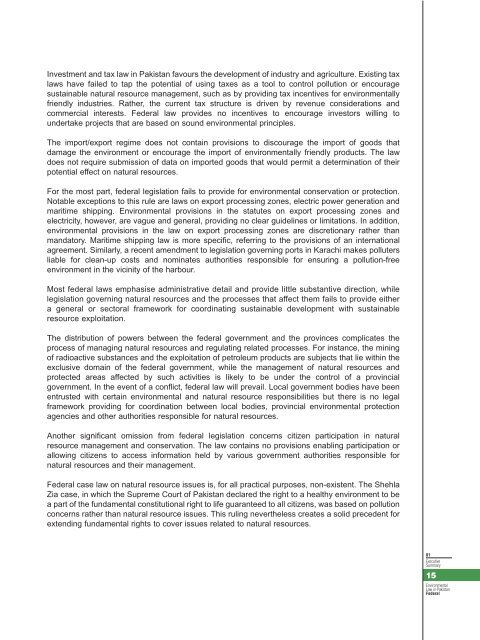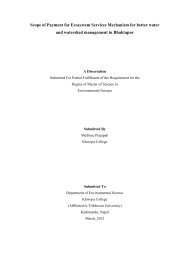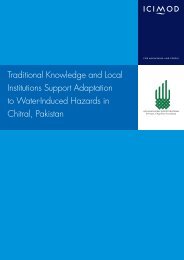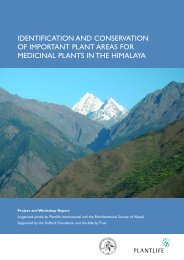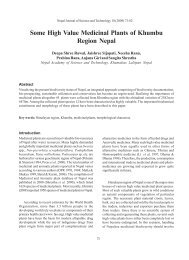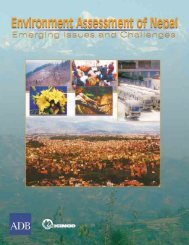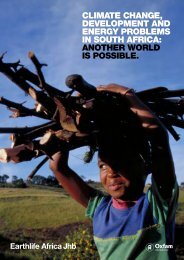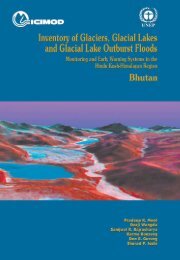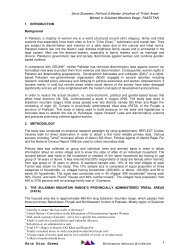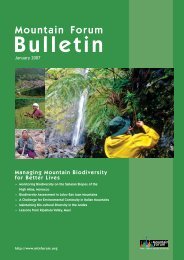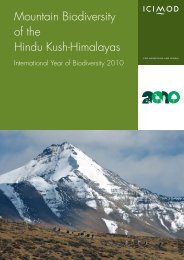Environmental Law in Pakistan - IUCN
Environmental Law in Pakistan - IUCN
Environmental Law in Pakistan - IUCN
Create successful ePaper yourself
Turn your PDF publications into a flip-book with our unique Google optimized e-Paper software.
Investment and tax law <strong>in</strong> <strong>Pakistan</strong> favours the development of <strong>in</strong>dustry and agriculture. Exist<strong>in</strong>g taxlaws have failed to tap the potential of us<strong>in</strong>g taxes as a tool to control pollution or encouragesusta<strong>in</strong>able natural resource management, such as by provid<strong>in</strong>g tax <strong>in</strong>centives for environmentallyfriendly <strong>in</strong>dustries. Rather, the current tax structure is driven by revenue considerations andcommercial <strong>in</strong>terests. Federal law provides no <strong>in</strong>centives to encourage <strong>in</strong>vestors will<strong>in</strong>g toundertake projects that are based on sound environmental pr<strong>in</strong>ciples.The import/export regime does not conta<strong>in</strong> provisions to discourage the import of goods thatdamage the environment or encourage the import of environmentally friendly products. The lawdoes not require submission of data on imported goods that would permit a determ<strong>in</strong>ation of theirpotential effect on natural resources.For the most part, federal legislation fails to provide for environmental conservation or protection.Notable exceptions to this rule are laws on export process<strong>in</strong>g zones, electric power generation andmaritime shipp<strong>in</strong>g. <strong>Environmental</strong> provisions <strong>in</strong> the statutes on export process<strong>in</strong>g zones andelectricity, however, are vague and general, provid<strong>in</strong>g no clear guidel<strong>in</strong>es or limitations. In addition,environmental provisions <strong>in</strong> the law on export process<strong>in</strong>g zones are discretionary rather thanmandatory. Maritime shipp<strong>in</strong>g law is more specific, referr<strong>in</strong>g to the provisions of an <strong>in</strong>ternationalagreement. Similarly, a recent amendment to legislation govern<strong>in</strong>g ports <strong>in</strong> Karachi makes pollutersliable for clean-up costs and nom<strong>in</strong>ates authorities responsible for ensur<strong>in</strong>g a pollution-freeenvironment <strong>in</strong> the vic<strong>in</strong>ity of the harbour.Most federal laws emphasise adm<strong>in</strong>istrative detail and provide little substantive direction, whilelegislation govern<strong>in</strong>g natural resources and the processes that affect them fails to provide eithera general or sectoral framework for coord<strong>in</strong>at<strong>in</strong>g susta<strong>in</strong>able development with susta<strong>in</strong>ableresource exploitation.The distribution of powers between the federal government and the prov<strong>in</strong>ces complicates theprocess of manag<strong>in</strong>g natural resources and regulat<strong>in</strong>g related processes. For <strong>in</strong>stance, the m<strong>in</strong><strong>in</strong>gof radioactive substances and the exploitation of petroleum products are subjects that lie with<strong>in</strong> theexclusive doma<strong>in</strong> of the federal government, while the management of natural resources andprotected areas affected by such activities is likely to be under the control of a prov<strong>in</strong>cialgovernment. In the event of a conflict, federal law will prevail. Local government bodies have beenentrusted with certa<strong>in</strong> environmental and natural resource responsibilities but there is no legalframework provid<strong>in</strong>g for coord<strong>in</strong>ation between local bodies, prov<strong>in</strong>cial environmental protectionagencies and other authorities responsible for natural resources.Another significant omission from federal legislation concerns citizen participation <strong>in</strong> naturalresource management and conservation. The law conta<strong>in</strong>s no provisions enabl<strong>in</strong>g participation orallow<strong>in</strong>g citizens to access <strong>in</strong>formation held by various government authorities responsible fornatural resources and their management.Federal case law on natural resource issues is, for all practical purposes, non-existent. The ShehlaZia case, <strong>in</strong> which the Supreme Court of <strong>Pakistan</strong> declared the right to a healthy environment to bea part of the fundamental constitutional right to life guaranteed to all citizens, was based on pollutionconcerns rather than natural resource issues. This rul<strong>in</strong>g nevertheless creates a solid precedent forextend<strong>in</strong>g fundamental rights to cover issues related to natural resources.01ExecutiveSummary15<strong>Environmental</strong><strong>Law</strong> <strong>in</strong> <strong>Pakistan</strong>Federal


